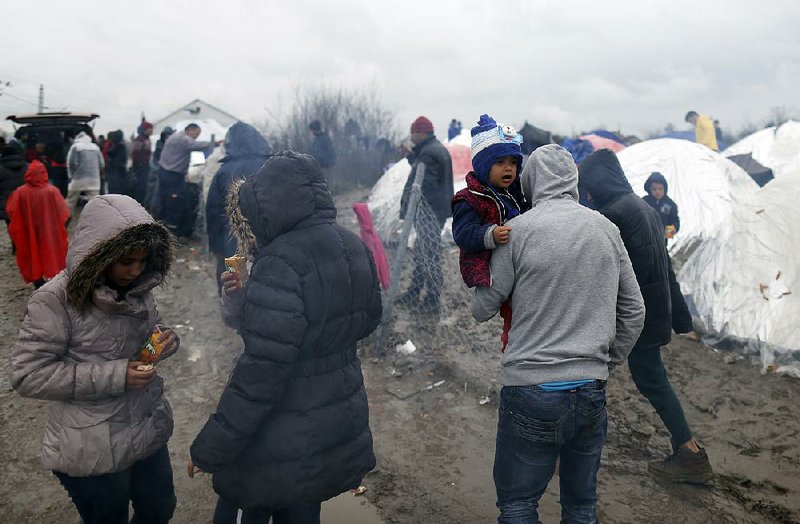ATHENS, Greece -- The closing of Europe's main migrant route to Germany has stranded more than 40,000 in Greece. Hundreds of thousands more -- from Afghanistan, Iran, Iraq, Syria and other countries across the Middle East and Africa -- risk being bottled up in Turkey if a European Union deal to slow the migrant flow is formally approved next week.
One result is new opportunity for human smugglers. With migrants searching for alternate routes, even with the chance of heightened physical risk and exploitation, smugglers are scoping out new paths into Europe and fanning out among asylum seekers in Greece promising help.
"Migrants still want to go to the EU, and there will be alternate routes looked for and offered by organized crime," said Wil van Gemert, the deputy director of Europol, Europe's police agency. The difference, he added, is that "they will operate more covertly, using difficult routes despite increased enforcement" by countries trying to stop them.
In Greece, smugglers are peddling offers to take migrants clandestinely to Italy, either by boat from the Greek mainland or by a more precarious route walking through the mountainous terrain of Albania, where they can then cross the Adriatic Sea. Others are offering to take them on less guarded paths through Macedonian forests, or to Bulgaria to reach Serbia and beyond.
In the camp at Idomeni, at the border with Macedonia, where more than 13,000 migrants have been stuck in muddy conditions after Macedonia sealed its border, talk of smuggling is everywhere.
Migrants point to the Hara Hotel and to gas stations along the highway to Idomeni as places where smugglers loiter and operate.
Europol and Italian officials also are concerned that old migrant routes through Libya or Egypt, which became much less appealing after Germany said it would welcome legitimate asylum seekers last year, may be revived to get people to the Italian island of Lampedusa. And in northern Europe, Finland and Scandinavian governments are monitoring whether smugglers may intensify the use of a route through Russia, including by the Black Sea from Turkey.
So far, authorities have yet to see a major migrant flow along any of those paths. But governments are girding for the possibility, especially when the weather turns warmer in the spring.
Albania deployed hundreds of special police officers this week to its frontiers with Greece and Macedonia. Italy said Friday that it would send about two dozen officers to help Albania patrol its border.
Mario Morcone, the Italian Interior Ministry's top immigration official, said discussions with the Albanian government were underway "on how to best collaborate," including providing technological assistance.
While there were "no concrete signals" yet of an imminent influx through the Adriatic, Italy has stepped up its patrols in those waters, he said.
Bulgaria announced plans Friday to build a fence on the Greek border and to step up existing police patrols in case of "eventual increased migration pressure." The government received 40 Land Rovers donated by Britain this week to capture and return refugees at the country's borders with Turkey and Serbia.
NATO is patrolling the territorial waters of Turkey and Greece, where more than 100,000 migrants have made perilous crossings since January.
To try to stop the smugglers who make many of the migrants' voyages possible, NATO is working to improve information exchanges between both countries and Frontex, Europe's border agency.
Whether such efforts prove effective remains to be seen. Last year, migrant smuggling became the fastest-growing criminal market in Europe, according to a recent Europol report, with an estimated turnover of nearly $3.35 billion to nearly $6.7 billion.
The amount could double or triple if the scale of the current migration crisis persists this year, the agency warned.
"Smugglers are like the Hydra: You cut off one head and two new ones spring up," said Rear Adm. Iwannis Karageorgopoulos, the director general for security and law enforcement at the Greek Coast Guard.
"The best way to eradicate migrant smugglers is to take away their clientele," he said.
At the Piraeus port near Athens, where more than 3,000 migrants are camped in pup tents and cargo warehouses facing the Aegean Sea, the smugglers have found fresh quarry. Those debarking from the ferry often are met by men offering to make false visas, good for entry into the European countries that are members of the Schengen zone of passport-free travel, for about $5,000.
Mirwas Mahmoodi, a 21-year-old Afghan, listened in desperation to some who promised to make a fake ID and put him on a plane to enter Germany "legally" if he paid about $8,900. When he told them he was short of cash, they offered to take him through Macedonian forests for about $1,100 to continue north.
"They told me, 'The border is closed forever,'" he said. "'You'll never get to Europe unless you use me.'"
Information for this article was contributed by Apostolis Fotiadis, Jim Yardley and Elisabetta Povoledo of The New York Times.
A Section on 03/12/2016


